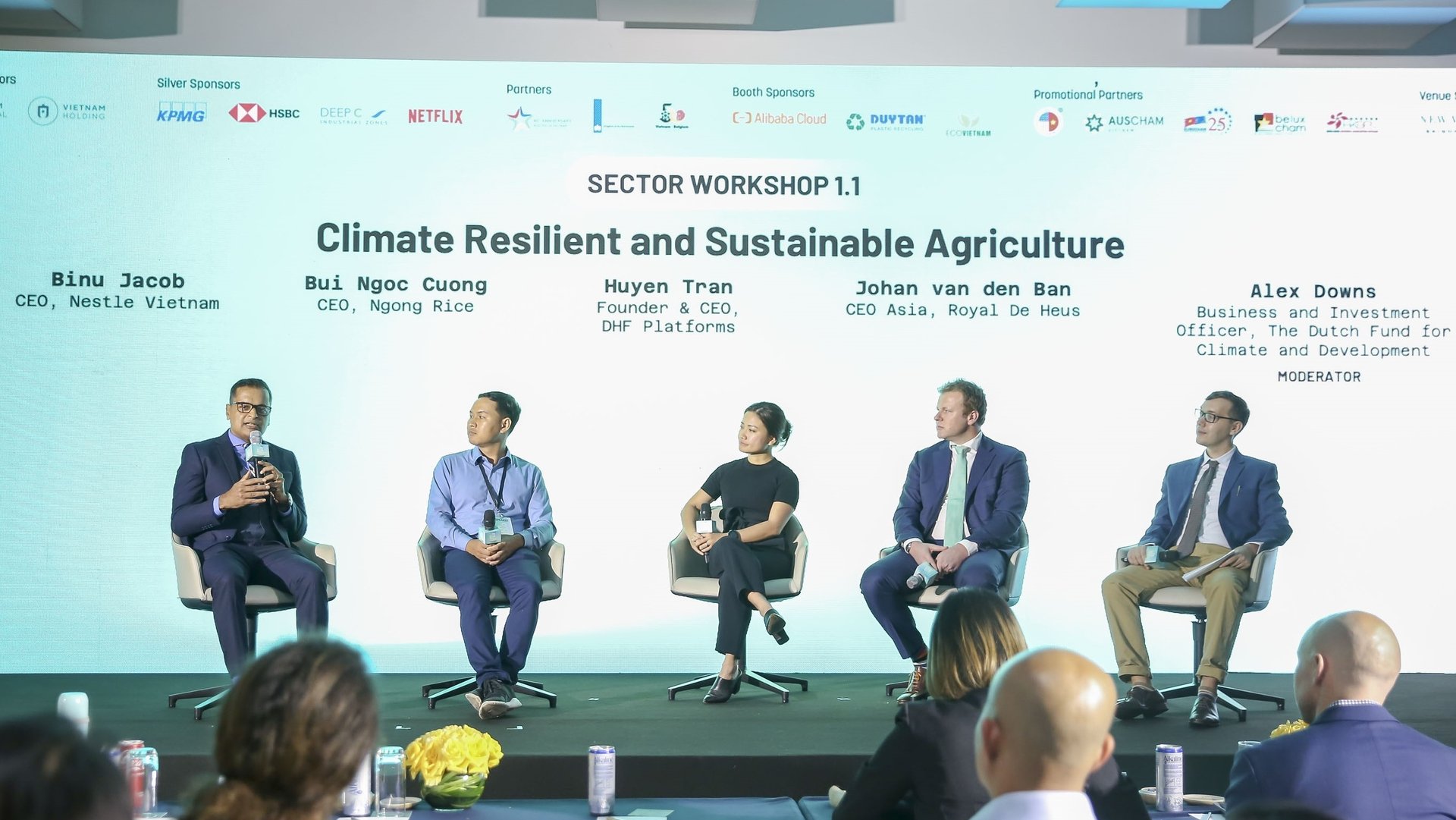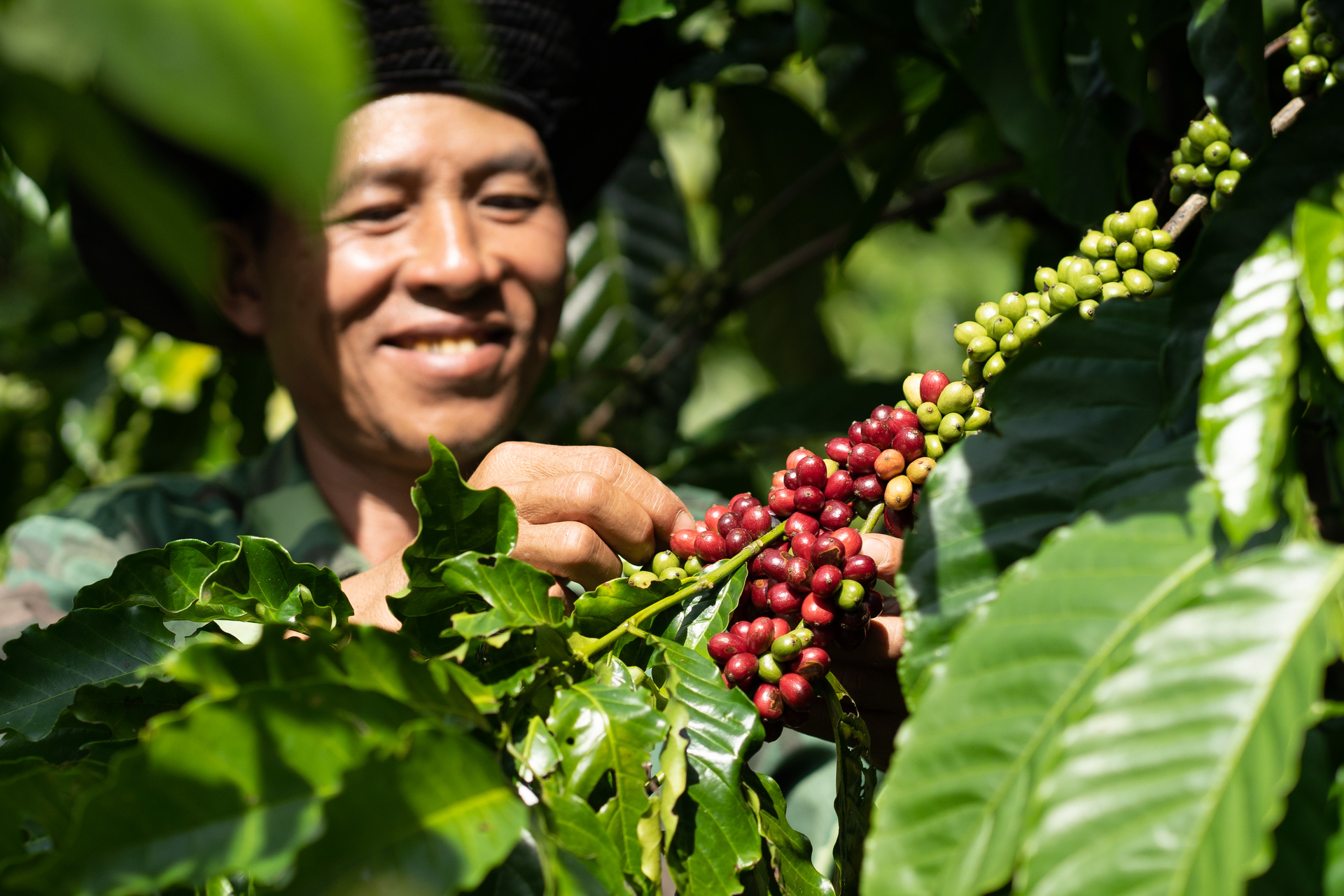May 29, 2025 | 16:20 GMT +7
May 29, 2025 | 16:20 GMT +7
Hotline: 0913.378.918
May 29, 2025 | 16:20 GMT +7
Hotline: 0913.378.918

Mr. Binu Jacob (far left), General Director of Nestlé Vietnam, discussing with 50 ESG 2023 investment businesses at a workshop.
Fifty ESG 2023 investment enterprises recently attended a workshop in Ho Chi Minh City to discuss "Climate change and its increasingly strong impacts on the economy, society and environment". Accordingly, participating businesses concurred that it is imperative to work toward a sustainable future for future generations by adapting to climate change and gradually reducing greenhouse gas emissions.
As a leading company in the food industry, Nestlé Vietnam focuses on solutions to reduce greenhouse gas emissions throughout the supply chain. Furthermore, the company plays a crucial role in promoting Vietnam's transition to sustainable agricultural production. Consequently, Nestlé Vietnam aims to establish a regenerative food system, ensure a sustainable food supply, address climate change, and enhance livelihoods and biodiversity.
According to Mr. Binu Jacob, General Director of Nestlé Vietnam, farmers relied heavily on chemical fertilizers and pesticides in order to boost crop productivity. However, this uncontrolled use of chemicals has adversely affected the quality of cultivation soil. If this farming method persists, there may be no food left for future generations. "We encourage farmers to switch to regenerative agriculture, which is based on soil and crop quality. We believe it can help protect our planet," he said.
The goal of regenerative agriculture is to improve soil quality and fertility as well as protect water resources and biodiversity. Improved soil quality will strengthen the crop's resilience to the effects of climate change, boost productivity, improve farmers' incomes and livelihoods, and increase carbon sequestration.

Coffee farmers participating in the Nescafé Plan program produce coffee according to the "4C" criteria.
Regenerative agriculture has been integrated and implemented in Vietnam within the framework of the Nescafé Plan, a sustainable development program since 2011.
According to the program, Nestlé Vietnam shares regenerative agricultural practices with coffee farmers in the Central Highlands. These practices combine five primary solutions: logical intercropping, application of microbial organic fertilizer, water conservation, biodiversity enhancement and soil quality improvement.
After 12 years of implementation, the Nescafé Plan has helped over 21,000 farmers in the Central Highlands to produce coffee according to the "4C" criteria.
Furthermore, more than 330,000 farmers were trained in sustainable coffee farming, and 63.5 million disease resistant and high-yielding seedlings were distributed. As a result, the program has helped farmers save 40% of irrigation water, 20% of fertilizer, and 20% of production costs without compromising crop productivity.
During the Workers' Month, Nestlé Vietnam Company has collaborated with partners to provide disadvantaged workers with nutritional products in multiple provinces. Nearly 125,000 units of Nestlé Vietnam products including Milo barley milk, MaggiI soy sauce, Nescafé coffee, etc. have been delivered to employees.
Most notably, Nestlé Vietnam cooperated with the Golden Heart Charitable Social Fund under the Vietnam General Confederation of Labor and the Dong Nai Provincial Labor Confederation to donate 2,600 gifts to disadvantaged union members, workers and patients in the cities of Hai Phong, Hai Duong, Ho Chi Minh City and Dong Nai.
Translated by Nguyen Hai Long
/2025/05/25/4127-3-073637_820.jpg)
(VAN) Thanks to the promotion from an FAO-implemented project, vegetable production in greenhouses in Moc Chau has seen strong development, from 1.5 hectares in 2021 to nearly 50 hectares in 2024.

(VAN) FAO has recently supported USD 140,000 to implement the project 'Risk mitigation human-animal interface risks through disease control initiatives in pig farming.'

(VAN) The People's Committee of Tra Vinh province has approved an adjustment to the investment policy for the Green Hydrogen Plant project, increasing its area to approximately 52.76 hectares.
![Reducing emissions from rice fields: [2] Farmers’ commitment to the soil](https://t.ex-cdn.com/nongnghiepmoitruong.vn/608w/files/news/2025/05/05/dsc08881jpg-nongnghiep-140632.jpg)
(VAN) Clean rice cultivation model in Thuong Tan commune, Bac Tan Uyen district, is assisting local residents in achieving sustainable agriculture by substantially reducing costs, increasing productivity, and protecting the environment.

(VAN) At the conference to disseminate Resolution No. 68, AgriS introduced its digital agricultural ecosystem and reaffirmed its commitment to accompanying the Government in promoting private sector development and sustainable agriculture.

(VAN) 'Blue Ocean - Blue Foods' initiative is designed to restore marine ecosystems and establish sustainable livelihoods for local communities by cultivating a minimum of 1,000 hectares of cottonii seaweed in the first three years.
/2025/05/21/4642-3-112707_603.jpg)
(VAN) The V-SCOPE project has made direct contributions to three out of six pillars of the Comprehensive Strategic Partnership between Vietnam and Australia.